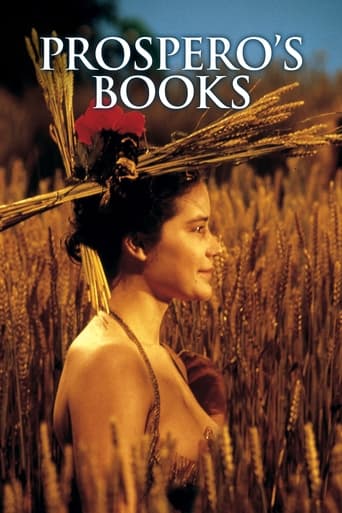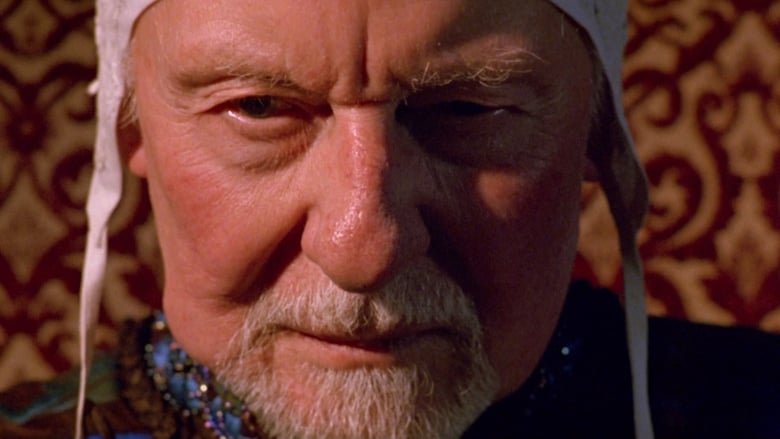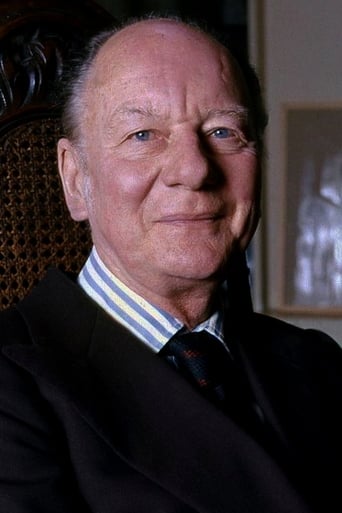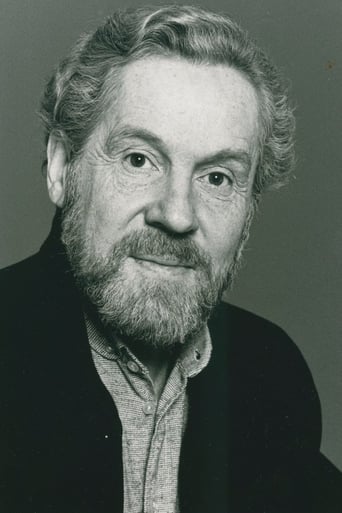

Prospero's Books (1991)
An exiled magician finds an opportunity for revenge against his enemies muted when his daughter and the son of his chief enemy fall in love in this uniquely structured retelling of the 'The Tempest'.
Watch Trailer
Cast
Reviews
Overrated
Ok... Let's be honest. It cannot be the best movie but is quite enjoyable. The movie has the potential to develop a great plot for future movies
Unshakable, witty and deeply felt, the film will be paying emotional dividends for a long, long time.
what a terribly boring film. I'm sorry but this is absolutely not deserving of best picture and will be forgotten quickly. Entertaining and engaging cinema? No. Nothing performances with flat faces and mistaking silence for subtlety.
. . . it's a pity the aesthetic choice was made to *not* tell the story.That's my take-away from last night's viewing, my first since the film's theatrical release some 25 years ago. If you know Shakespeare's 'The Tempest' you'll fill in the narrative; if not, you'll have a splendid two-hour hallucination.But 'Prospero's Books' is the 800-pound gorilla of art films. Nothing like it before or since. F'ing glorious pile of exquisity.After Peter Greenaway's stunning vision, Michael Clark's Caliban is the star, along with the naked human body in all sizes, shapes and ages -- by the army-full, non-eroticized -- marginalia etchings come to life, caryatids, collossi, etc. Gielgud's celebrated voice murmurs most of the lines, but only somebody who didn't see it to the end (or parroting somebody who didn't) will make the false claim that no actor but Gielgud speaks. The sound is beautifully engineered, vocals and music.
Every now and again you hear radio djs inviting listeners to nominate movies that the listener can't stand or never watched all the way through. This is the movie that I think of...days later.It's got something to do with a play by Shakespeare. Not sure, but I think I bailed on this movie some 20 odd minutes into it...think I realised that my toenails wouldn't clip themselves, and they were looking at me imploringly to get cut.This movie just seemed boring and pretentious to me.Even though this is the first movie I've given such a low score to (which I've actually attempted to watch), I wouldn't want to put you off other movies by it's English director, Peter Greenaway. I remember thinking that his "The cook, the thief, his wife and her lover" was a truly great British film even though its content was at times stomach churning-a brilliant movie, but I can understand why people would balk at seeing it.Another good film by Greenaway was "A zed and two noughts". Again, it had some content that pushed the boundaries of good taste, but was intriguing nonetheless.The other film that I usually think of too late for such radio show topics is "Brazil". Never managed to watch that all the way through either-kept falling asleep!Unless you have a taste for self-important movies which are off-puttingly highly stylised, laboriously paced and difficult to follow, then steer clear of Prosero's Books.
Prospero's Books is nothing less than an almost overwhelming feast of images, stuffed with charms, magic and metaphors. It is Peter Greenaway's vision of what The Tempest might have been had Prospero used those 24 books of great knowledge and magic he took with him when he was sent into exile by his brother. Prospero had been the Duke of Milan when he was overthrown. Twelve years later he inhabits an island with his daughter, Miranda, who was three when they were sent away. There is Caliban, of course, a "freckled whelp, hag- born," but all the other inhabitants are sprites and spirits. And now Prospero, delving into his books and writing his story, imagines his revenge. The first of his books is The Book of Water, a tome of parchment pages that bring rain and mist and dripping tears. As Prospero lies in a pool and writes, his captured sprite, the child Ariel, urinates spell-like into the calm water, and we see Prospero's tale of a vast tempest that brings to the shore of his island his enemies, and the son of one of them. As Prospero writes we see the books and the images from them...The Book of Mirrors, The Book of Colours, The Atlas Belonging to Orpheus, A Primer of Small Stars, The Book of Utopias, The Book of Love..."drawings of a naked man and a naked woman. Everything else is conjecture." From these books we flow into Prospero's magic world of revenge, as he takes the knowledge of his books to add layers to his plans and his story. Yet when Miranda spies young Ferdinand she falls immediately in love. Having only known her father and the scabrous Caliban, Ferdinand is the most beautiful creature she has ever seen. "O, wonder! How many goodly creatures are there here! How beauteous mankind is! O brave new world that has such people in't!" she cries. Prospero cannot deny his daughter, yet he knows this all is just a story that he is writing...or is it? Even as Ferdinand and his daughter pledge their love, he says... "Our revels now are ended. These our actors, As I foretold you, were all spirits, and Are melted into air, into thin air: And, like the baseless fabric of this vision, The cloud-capped towers, the gorgeous palaces, The solemn temples, the great globe itself, Yea, all which it inherit, shall dissolve, And, like this insubstantial pageant faded, Leave not a rack behind. We are such stuff As dreams are made on; and our little life Is rounded with a sleep." But not quite. Eventually, with the prodding from the several Ariels (a child, an adolescent, a young man) to whom Prospero keeps promising freedom, Prospero forgives his enemies and destroys his books. He is no less wise for all this. For over two hours Greenaway gives us images that float and mix, that overlay page upon moving page. John Gielgud, at 86, plays Prospero and speaks the words Prospero writes for all the characters. Around him are magical creatures that dance and run, sing and fall, who serve him and follow his commands. These creatures, male and female, young and old, are nude. Shoulders, hips, breasts, arms become as much an ingredient in the movie as the settings and exaggerated costumes. There are many times when the screen moves with jiggling male and female parts, but there also is an almost pagan naturalness that is neither carnal nor innocent. Greenaway sets up endless detailed images that are part Renaissance paintings, part dream settings and part tableaux. The camera rarely rests, but constantly moves through rooms and forests. The effect is just about overwhelming. There is a reason that, in the middle of a fine, rich dinner a small scoop of sherbet is served. It lets us pause and ready our palate for the next course. We don't have that luxury with Prospero's Books, and in the middle of the movie I was longing for a rest. That's a small complaint for a movie which offers so much to the eye and the mind. The combination of Greenaway's vision and Gielgud's skill (and voice) is hard to overpraise. Although 86 when he filmed the movie, Gielgud projects that famous voice with subtlety, skill and, when needed, power. When he speaks the words Prospero has written for his daughter or for Ferdinand, he still sounds like Gielgud but he is so skilled he can differentiate between male and female, young and old. He gives a performance of real depth, and it's gratifying to see this great actor in such a rich and demanding part this late in his career. For those who like idiosyncratic works, I recommend Greenaway's The Draughtsman's Contract and The Cook, the Thief, His Wife and Her Lover. As for Prospero's Books...it simply is what it is.
The film is an adaptation of The Tempest, to be sure, but taken to imaginative heights. The photographic imagery is complex and rich, and slowly the story unfolds. Unfortunately, more slowly than necessary.Within many of the scenes is a staggering number of naked people who are no more contributory to the story than any building or fountain. There are numerous glimpses of pages of some of the books, with rapid changes of images, each so quick that they border on the subliminal. Interestingly, some of the arcane images were executed after the time the story was supposed to be taking place.The story of the Prospero-induced storm, and the interactions with the survivors and both Prospero and his daughter are familiar to most, but the plot advances slowly, probably too slowly for many viewers.There is a tradition in some magical philosophies that a magician derives his or her powers directly from whatever magical books he or she possesses, and this was presented in the film, from the play.(Spoiler) At the close of the film, Prospero's books are all destroyed save one. That one was one of Shakespeare's plays -- and the one the film is based on! That was a jarring touch.


